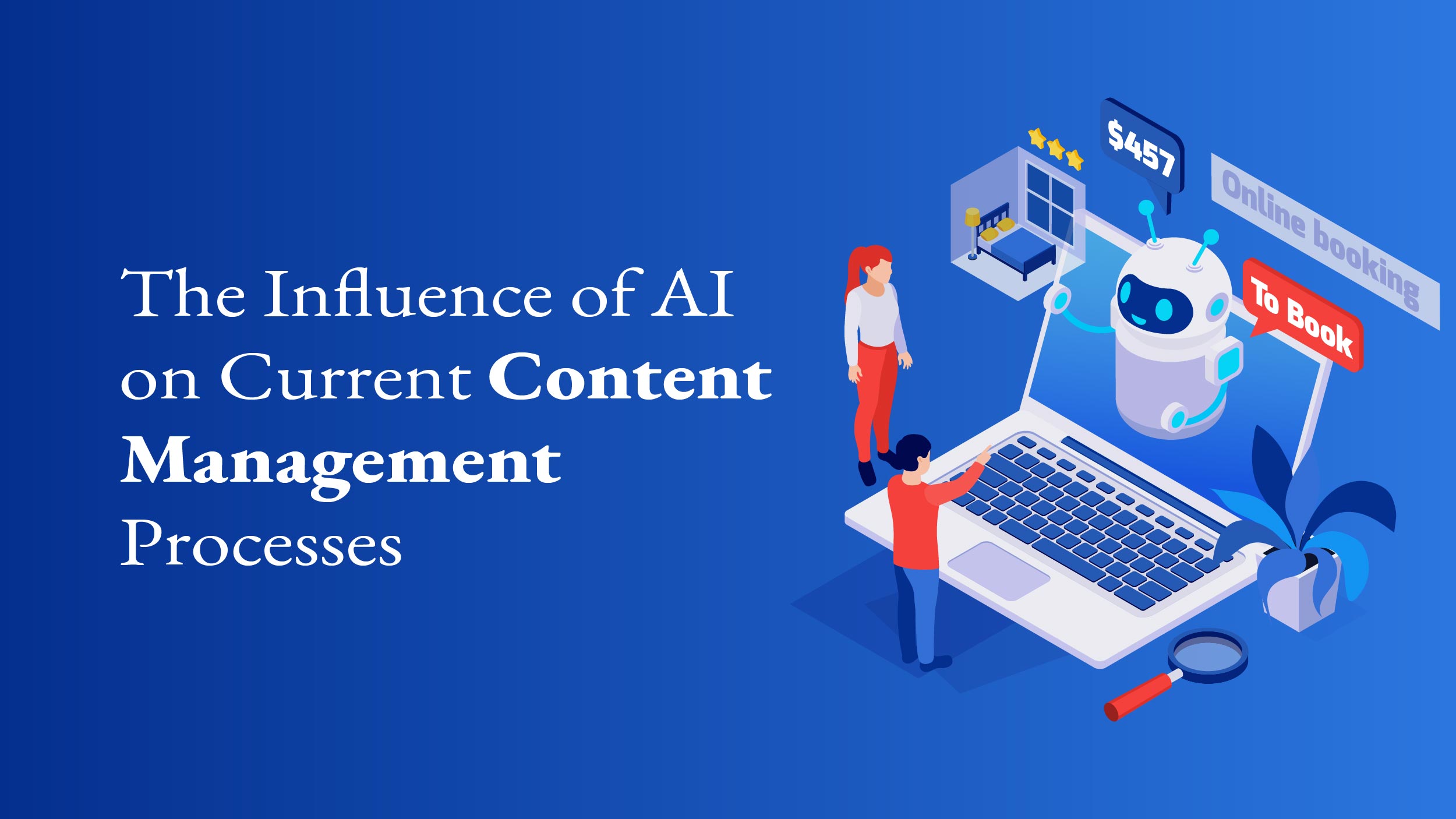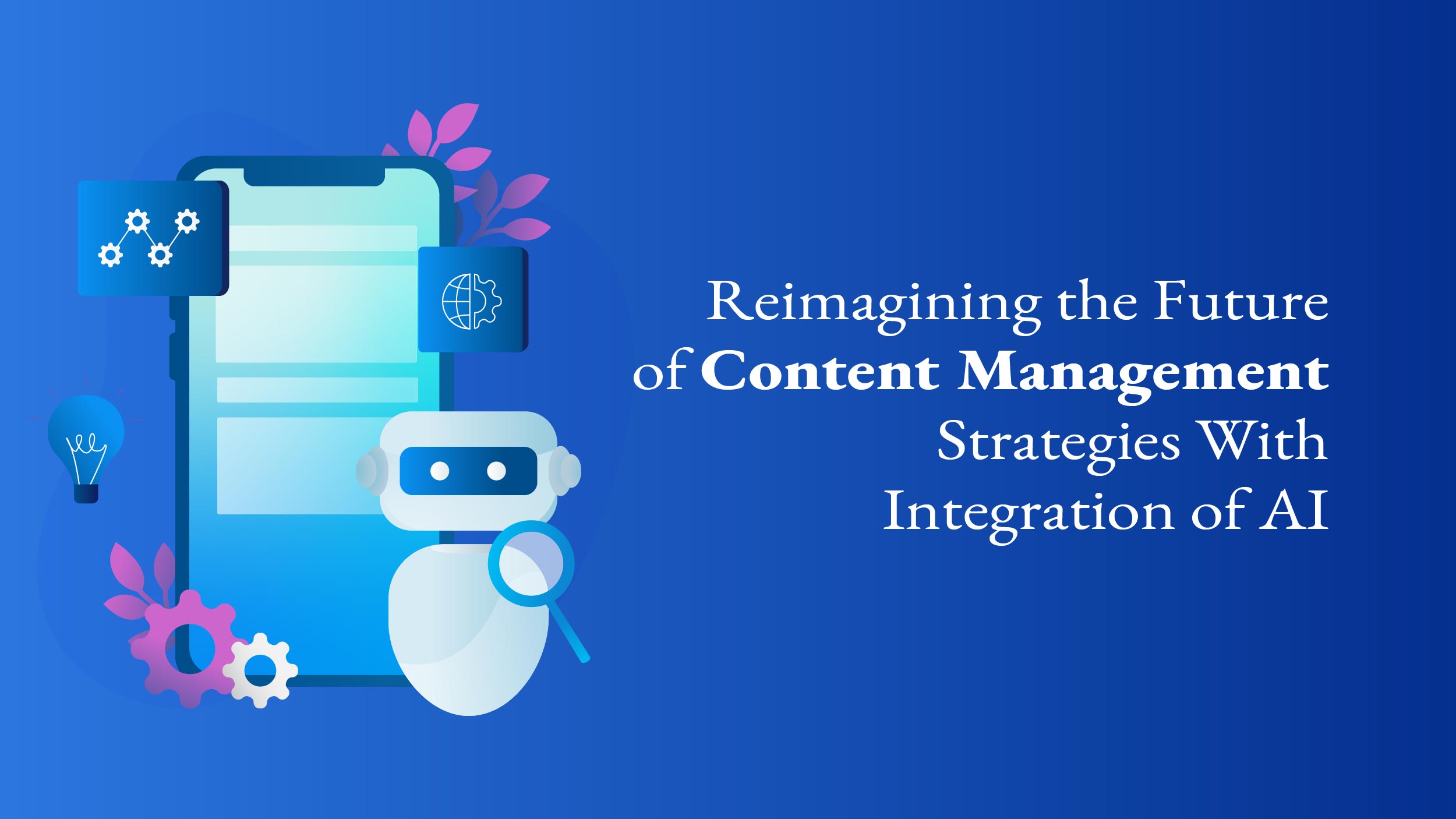Since the inception of artificial intelligence (AI), content management operations have been tremendously revolutionized. AI is now capable of automating complex tasks, improving user engagement, and offering tailored user experiences. The future of content management with integrated advanced technologies like AI is dynamic, accessible, and aligned with user expectations.
The potential applications of AI in managing content for organizations are immense and diverse. From leveraging generative AI to draft compelling content to using machine learning algorithms to enhance digital marketing strategies, this technology has a long way to go. In this article, we will dive deep into AI content management, its current applications, and potential opportunities in the future.
The Influence of AI on Current Content Management Processes
 Integrating AI into the enterprise tech stack to manage content operations can have a significant impact on the work processes. Following are a few ways AI would help to enhance the content management operations:
Integrating AI into the enterprise tech stack to manage content operations can have a significant impact on the work processes. Following are a few ways AI would help to enhance the content management operations:
1. Seamless Content Management Operations
Along with creating content and customizing it based on the user intent, AI helps streamline content management processes. Additionally, the tool also increases the operational efficiency of the department. Integration of AI into the content management systems has empowered the content teams to automate repetitive tasks, get intelligent insight, and focus on strategic initiatives. According to a report by Bynder, almost 50% of consumers can accurately detect AI-generated copies.
2. Tag and Curate Content Automatically
It can be a tedious, time-consuming, and labor-intensive task to curate and tag content manually. AI algorithms have the potential to evaluate and segment the content depending on its topic, relevance, and intent. This functionality of AI will streamline content creation, tagging, and categorization.
The best AI content management system (CMS) will automate repetitive tasks such as tagging images, creating metadata, and categorizing content. The tool even has the capability to evaluate the content performance and recommend edits for it to have a better reach and engagement. Integrating machine learning models trained on huge data sets will streamline the processes of organizing and retrieving content when required.
3. Easy Translation and Localization
In order to reach a wider audience globally, content translation plays an important role.
With the evolution of AI and its application, translation has become more sophisticated. AI translation tools can seamlessly translate content more accurately and quickly to ensure the message is received despite the language barriers.
4. Optimize SEO and Content Management
The essence of search engine optimization (SEO) is to increase the visibility and reach of digital content. AI content management systems have the functionality to evaluate keywords, trends, and user intent to improve content for multiple search engines efficiently.
Leveraging AI to generate keywords, enhance metadata, and track performance metrics enables content creators to make their content more discoverable and improve its ranking on search engine results pages (SERPs).
AI tools even evaluate the content performance to determine the trends, patterns, and potential optimization opportunities. Content marketing teams can make data-driven decisions by evaluating engagement metrics, conversion rates, and audience feedback. It is crucial to make necessary adjustments to the marketing campaign based on reports generated and user feedback.
5. Distributing Content
Distribution of content is another aspect that AI can revolutionize. AI content management systems can detect the best timing to distribute content depending on the target audience’s behavior and platform analytics. Integrating AI tools to manage content can enable organizations to deliver the right messages at the right time to the right audience to increase their impact and reach.
Also Read: Why Is Content Management A ‘Must Have’ For Efficient Content Marketing
Reimagining the Future of Content Management Strategies With Integration of AI
 After understanding the core aspects of where AI is currently revolutionizing content management, let us look at the potential opportunities that AI could create content operations:
After understanding the core aspects of where AI is currently revolutionizing content management, let us look at the potential opportunities that AI could create content operations:
A.Collaboration Between Different AI Tools
AI has become an integral part of human life, which cannot be avoided. Right from smart home appliances to AI-driven machines, individuals come across multiple AI devices in their daily lives. Similarly, industry veterans in the content sector are exploring opportunities to integrate various AI tools. Developers are looking to integrate all the different content-related tools with AI into one platform. These tools are capable of interacting with each other to offer faster functionality and enhanced customer experience.
B.Real-Time SEO Improvements
With the immense evolution in AI-based content management systems, these tools will help digital marketers detect opportunities to improve their SEO strategies in real time. Suggesting SEO improvements in real-time empowers marketers to develop compelling content quickly that stands apart from the competitors and has a better ranking on search results.
C.Identify Gaps in Content
It can be difficult for marketers to understand where their or their competitor’s content might be lacking. It is essential to identify these gaps to gain more traffic. AI content management systems will enable the teams to identify the gaps and seize opportunities to improve their content operations. Overcoming these gaps would deliver content that adds value to the organization’s image and gather new leads.
Wrapping it Up
There are exciting opportunities that AI content management systems have opened up for the content industry. Right from automating content creation and management, there are immense new opportunities that are yet to be explored. Content management systems with AI can potentially revolutionize the work of content creators, website owners, and marketers.


Comments are closed.